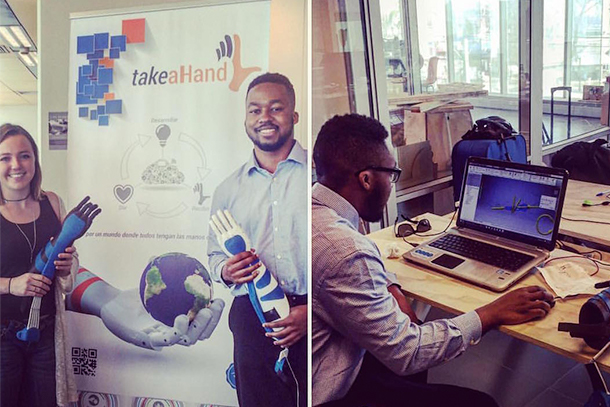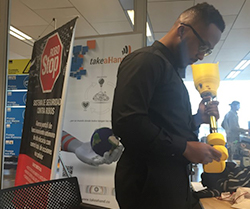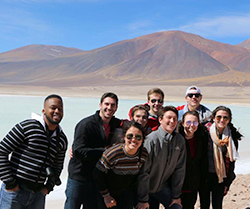
During his three-month internship with TakeaHand, Robinson Laventure, Penn State student in biological engineering, worked with other Sage Corps fellows and TakeaHand engineers to redesign 3D-prosthetics.
Innovating Abroad
Engineering student interns with Chilean 3D-printed prosthetic startup
05/17/17
UNIVERSITY PARK, Pa. — When searching for internship opportunities for summer 2016, Robinson Laventure, Penn State student in biological engineering, took to LinkedIn. There, an ad for Sage Corps, a program that pairs college students with international technology startups, jumped out to him because of its request for entrepreneurial-minded students — something that aligned perfectly with Laventure’s minor in engineering entrepreneurship.
“That’s something I really wanted to do with my life — do something entrepreneurial. I knew this was the program for me,” he said. “I saw what they were about and the type of students that were in the program.”
During his video interviews, Laventure was asked about his entrepreneurial knowledge. He was able to draw from different experiences from the Engineering Entrepreneurship program and the entrepreneurship minor — specifically focusing on projects where he learned how to create a business, how to create a product and how to find customers.
Successful interviews led to Laventure’s selection as a Sage Corps fellow. Soon after he began the internship matching process. This included an interview with a startup CEO and completing a self-assessment and mission statement; a design thinking course; workshops; and group calls with his Sage Corps cohort.
Because of Laventure’s background in engineering and entrepreneurship, he was paired with TakeaHand, a Chilean-based biotechnology company that creates 3D-printed prosthetics for amputees in South America.
The pairing was perfect for the biological engineering student focusing on the agricultural engineering option — an option that emphasizes machinery systems and structural design.
During his three-month internship in Santiago, Chile, Laventure and another Sage Corps fellow, along with TakeaHand’s CEO and other engineers, worked to redesign the BIOstep, the company’s 3D-printed leg prosthetic.
The team created an updated design made from polylactic acid — a material that most 3D printers use — aluminum, springs and various other inexpensive materials.
“We spent the whole summer working on modeling, designing and making the product better, more efficient, all while keeping the cost down,” he said.
At the end of the 8-week internship, Laventure and his team were able to finish the redesign and see amputees test the prosthetic.
“You don’t always get to do changing work like this in college classes. To actually see your hard work pay off and see you are helping people with the things that you learned is exciting,” he said.
Laventure said his Engineering Entrepreneurship Program coursework and experiences helped him tremendously during his internship in Chile. He said he was able to take the skills and concepts he learned as an engineering student at Penn State and apply and build upon them during his time in Chile.
In addition to bettering his design skills, Laventure said the experience with Sage Corps opened his eyes to the importance of being a global engineer.
“In the United States, we have a lot of advantages. We have a lot of things that are going for us, but in other countries, it’s just not the same,” he said.
Though participation in the program does include a cost component, Laventure stresses that interested students shouldn’t dwell on that aspect because opportunities for aid are available.
“We are entrepreneurial-minded students; we can find ways to make it work,” he said.
The Engineering Entrepreneurship program, housed within the School of Engineering Design, Technology, and Professional Programs, provided partial funding for Laventure’s Sage Corps internship experience in Santiago, Chile.
The engineering entrepreneurship minor is now being offered as the Technology Based Entrepreneurship cluster within Penn State’s Intercollege Minor in Entrepreneurship & Innovation (ENTI).
MEDIA CONTACT:
Samantha Chavanic
smh5218@engr.psu.edu




